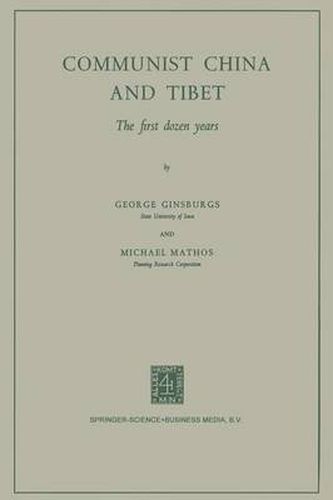Readings Newsletter
Become a Readings Member to make your shopping experience even easier.
Sign in or sign up for free!
You’re not far away from qualifying for FREE standard shipping within Australia
You’ve qualified for FREE standard shipping within Australia
The cart is loading…






This title is printed to order. This book may have been self-published. If so, we cannot guarantee the quality of the content. In the main most books will have gone through the editing process however some may not. We therefore suggest that you be aware of this before ordering this book. If in doubt check either the author or publisher’s details as we are unable to accept any returns unless they are faulty. Please contact us if you have any questions.
The signing in Peking on May 27, I95I, of the I7-point Agreement on Measures for the Peaceful Liberation of Tibet marked the end of Tibet’s latest forty-year interlude of de facto independence and formalized an arrangement which, although in some respects differing from the earlier relationship between China and Tibet, in principle but reimposed the former’s traditional suzerainty over the latter~ Since then, the course and pattern of relations between the Central Government and the so-called Local Government of Tibet have undergone aseries of drastic reappraisals and readjustments, culmi and the flight of the Dalai Lama to nating in the rebellion of I959 India. These events, together with the recent degeneration of the Sino-Indian border dispute into a fuIl-fledged military confrontation, have served to dramatize the importance of Tibet from the point of view of global strategy and world diplomacy. Long before that, however, indeed ever since Tibet’s occupation by the Chinese Red armies and the region’s effective submission to Peking’s authority, the Tibetan question had already assumed the status of a major political problem and that for a variety of good reasons, internal as weIl as international. From the vantage-point of domestic politics, the Tibetan issue was from the very start, and still is now, of prime significance on at least three counts.
$9.00 standard shipping within Australia
FREE standard shipping within Australia for orders over $100.00
Express & International shipping calculated at checkout
This title is printed to order. This book may have been self-published. If so, we cannot guarantee the quality of the content. In the main most books will have gone through the editing process however some may not. We therefore suggest that you be aware of this before ordering this book. If in doubt check either the author or publisher’s details as we are unable to accept any returns unless they are faulty. Please contact us if you have any questions.
The signing in Peking on May 27, I95I, of the I7-point Agreement on Measures for the Peaceful Liberation of Tibet marked the end of Tibet’s latest forty-year interlude of de facto independence and formalized an arrangement which, although in some respects differing from the earlier relationship between China and Tibet, in principle but reimposed the former’s traditional suzerainty over the latter~ Since then, the course and pattern of relations between the Central Government and the so-called Local Government of Tibet have undergone aseries of drastic reappraisals and readjustments, culmi and the flight of the Dalai Lama to nating in the rebellion of I959 India. These events, together with the recent degeneration of the Sino-Indian border dispute into a fuIl-fledged military confrontation, have served to dramatize the importance of Tibet from the point of view of global strategy and world diplomacy. Long before that, however, indeed ever since Tibet’s occupation by the Chinese Red armies and the region’s effective submission to Peking’s authority, the Tibetan question had already assumed the status of a major political problem and that for a variety of good reasons, internal as weIl as international. From the vantage-point of domestic politics, the Tibetan issue was from the very start, and still is now, of prime significance on at least three counts.